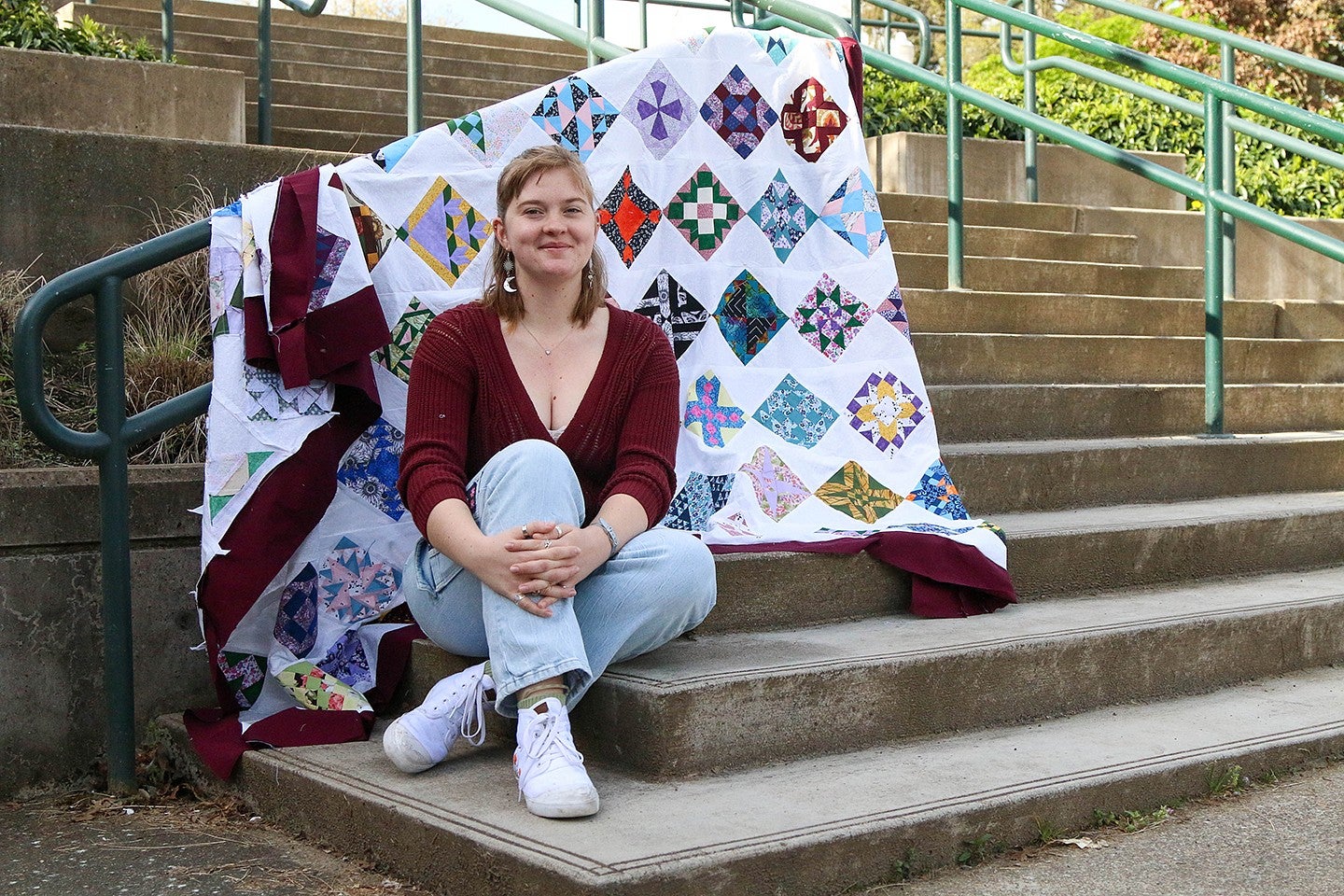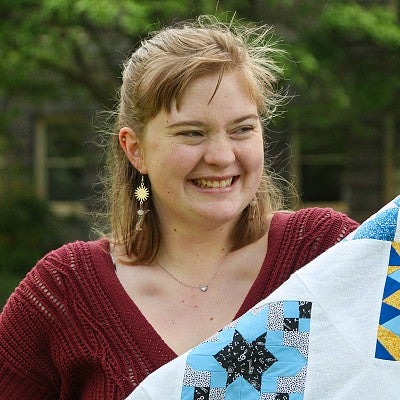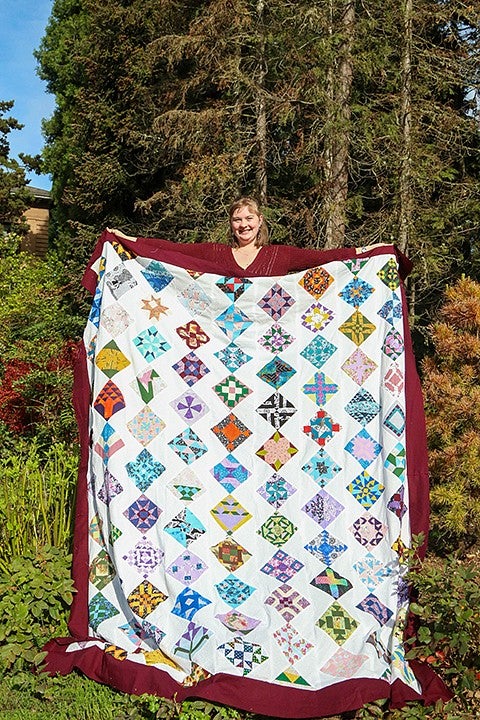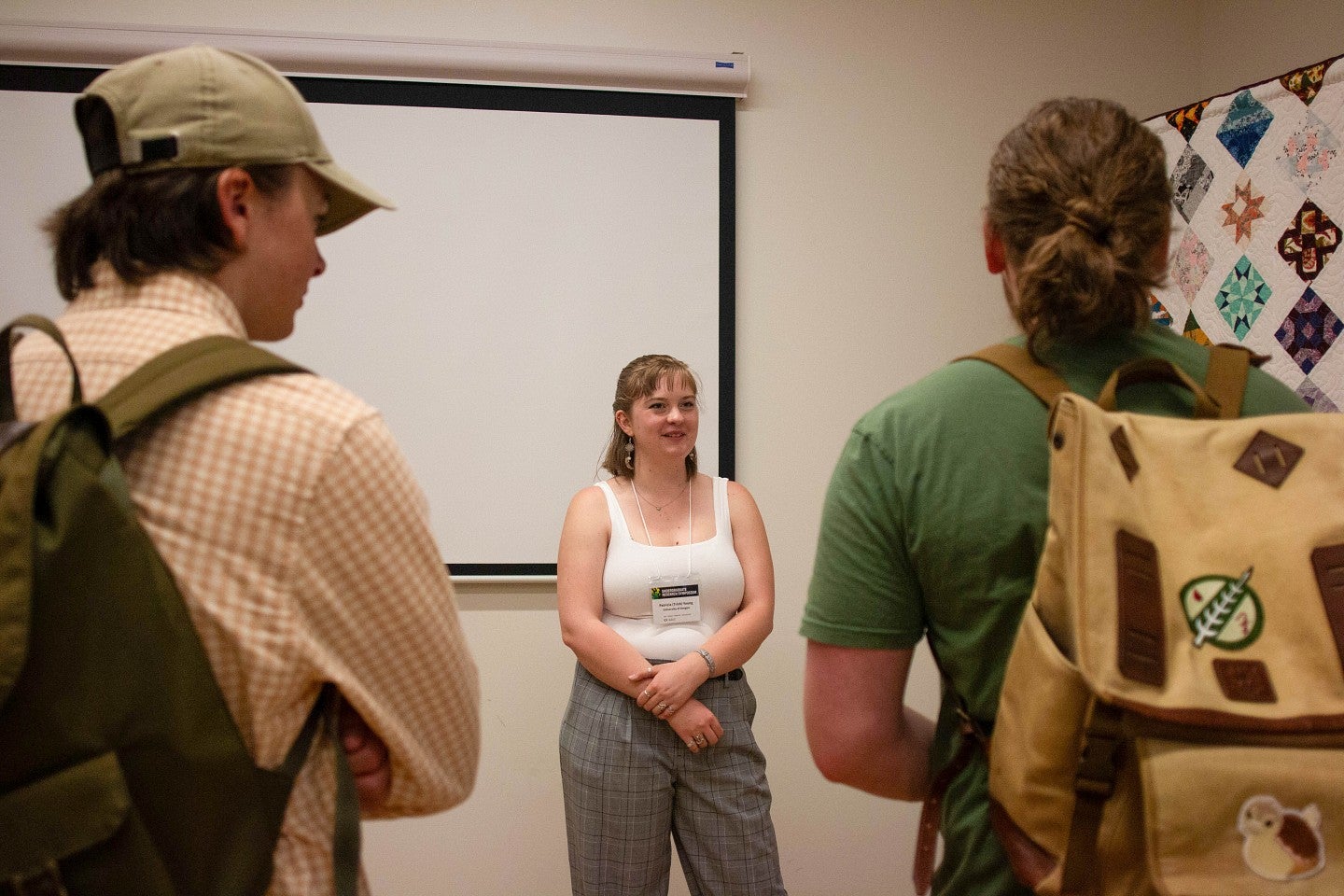
Stitching together a story
Trish Young remembers lowering her pencil as tears streamed down her cheeks. She was frustrated, not with the science or math or whatever she was learning at the time in middle school. She was tired of the persistent feeling of fatigue and the fear of “messing up.”
That night at home, Young scrolled through social media and online discussion boards for the disabled community. She came across an approach called “spoon theory,” where you visualize a set of spoons and use them to describe the difference in the energy used by people to complete a task.
Where it took some kids the equivalent of one spoon to shower or make a meal, it took Young maybe two or three spoons.
“Once I was able to actualize the way I was feeling through this metaphor, I had a better understanding of what I was capable of,” Young recalls. “It helps me remember that just because I need a little extra support sometimes, (that) doesn’t mean that I can’t accomplish regular things. It just means that sometimes I have to go about it differently to accomplish the same thing that someone else could do easily.”
As Young—who uses both she and they pronouns—graduates from the Clark Honors College with a degree in anthropology, she looks back on the hurdles of childhood and realizes that the UO is where she finally got the help she needed.

Trish Young
Major: Anthropology with a concentration in archaeology
Thesis: “Weaving History: An Anthropological Analysis of Quilting & Femininity in the PNW, 1930s and 2020s”
Describe your experience at CHC in a few words: Challenging, community, learning, good outlet, creativity
Advice to incoming first-year students: Let yourself do more things than you think you want to; you can always go home in the middle of an event.
Song you have on repeat: “The Phantom of the Opera”
Book everyone should read: One of the “Lord of the Rings” books.
Movie everyone should watch: One of the “Lord of the Rings” movies.
I’m grateful for: My mom
Diagnosed with autism and ADHD two years ago, she says acknowledgment of her disabilities made her realize that she had to navigate campus and the world differently than others. She relied on staff at UO’s Accessible Education Center for help. “The world isn’t necessarily made for people like me—but people like me can start shaping the world around us to be more accessible,” Young says.
Her thesis played an integral part in her experience at the CHC. And she credits her academic experience and valuable mentorship as critical to her success. With a strong identity, a sense of humor and an adventurous spirit, Young has set the bar high for herself.

As part of her thesis, Young stitched together a 77-inch by 94-inch quilt that paid homage to a popular style of quilting in the 1930s. She had grown up watching her mother make Halloween costumes and curtains. During the pandemic, Young started making cloth masks herself. She graduated to quilt making in 2023.
“(Trish) just seems to pick things up, with only minimal instruction,” says her mother, Vicki Young. “She knows how she wants it to turn out and will keep trying until she gets it right.”
Young’s interest in anthropology intersects with a passion for sewing she learned from her mother. “The tools we use today, humans have been using for centuries — and they haven’t changed all that much,” she says, pointing out that bone needles and old weaving techniques have been used throughout history.
Renaissance person
As a kid, Young participated in a variety of activities. She played the trumpet, was on the student council, and was a member of the volleyball team. Her name is attached to the freshman record in track and field for the 300-meter hurdles at her high school.
“As she got older, one of the most remarkable changes about her was her willingness to try new things, and be quite good at them from the start,” says Vicki Young.
Summers were spent at her grandparents’ apple orchard in Mariposa, Calif., where she played in the dirt and climbed trees with her cousins. Family reunions took them to St. Olaf College in Northridge, Minnesota, thanks to her big Scandinavian family.
“My mom is very creative and my grandmother is a watercolor painter, while my dad is less artistic,” Young says. “I was frequently encouraged to do what I was interested in and fortunate enough to have the time and money to do that, so I ended up trying out a lot of creative outlets.”
She grew up loving the outdoors. When she was younger, she and her father, Brad Young, traveled from Northern California to the U.S.-Mexico border along the Pacific Crest Trail. Each year for 17 years they have chipped away at their goal of hiking the entire length of the famous hiking circuit. They plan to finish up the last leg by traveling from Washington state up to Canada this summer.

Young kept busy in her time at UO and the Honors College by joining the university’s Marching Band. She also was a member of the club rowing team. The activities helped her stay focused, providing the needed routines each day to stay on task in her other work.
She remembers fondly her first performance with the Oregon Marching Band in 2020, where members had to stand six feet apart on the practice field because of COVID-19 as she played her heart out on the trumpet to “Crazy in Love.”
A few years later, the band traveled to Arizona and played in the 2024 Fiesta Bowl. She even got the chance to lead the band when at one point one of the conductors had to step out during a performance and threw her to the helm. "I stood up and suddenly I was up there conducting,” she recalls.
Other highlights include the six weeks she spent in Iceland studying arctic ecosystems with the Wildland Studies program. It started out as a trip with 15 people she barely knew. Then they bonded over the stunning wildlife they saw, the freezing temperatures and hikes through rugged terrain.
At one point, their instructor made time for the group to visit an Icelandic trampoline. “We ran like kids to recess and spent all afternoon playing games and bouncing until we were numb,” Young recalls.
Coming into her own
In the end, Young points to her relationship with CHC Dean Carol Stabile as the key to her success as a student. “She is the kindest woman who encourages her students to succeed,” Young says.
For Stabile, Young stood out as someone who just needed a sounding board. And Stabile was happy to play that role.
“I remember her coming to my student hours more than a year ago,” Stabile recalls. “Like a lot of students who’d been in college through the pandemic, she was feeling adrift when it came to her thesis project. She was so warm and smart and funny, and she had a way of lighting up when she talked about the courses and activities that had inspired her.”
Young says that her college experience was different than other students.
“I feel like I did not get a typical college experience, but I got a unique one,” she says. “It expanded my view of the world. Sexuality, gender, relationships, neurodivergence were all part of it because I was forced to figure it out myself.”
In the short term, Young plans to move in with her partner, Stephen, and start sewing for commissions. After that, she hopes to integrate what she’s learned in college into a career that allows her to take advantage of her creativity.

